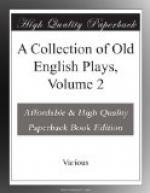Justina. How ere you please to style A lustfull appetite, it takes not mee. Heav’n has my bow my life shall never bee Elder then my unstain’d virginitie.
Cyprian. Virginitie! prize you so dearely that Which common things cast of? Marke but the flow’rs That now as morning fresh, fragrant and faire, Lay ope their beautys to the courting sunne, And amongst all the modest mayden rose: These wanton with the aire until unleavd They die and so loose their virginitie.
Justina. In India there is a flow’r (they say) Which, if a man come neare it, turnes away: By that I learne this lesson, to descrie Corrupt temptations and the tempter flie.
Leaves 245-267 are taken up with the Tragedy of Nero, which was printed in 1624. Then comes [Daborne’s] Poore Man’s Comfort (268-292), an inferior play printed in 1655. Afterwards follows a dull play (leaves 293-316), Loves Changlelings Changed, founded on Sidney’s Arcadia. The last piece in the book (leaves 317-349) is The lancheinge of the May, Written by W.M. Gent in his return from East India, A.D. 1632. There is a second title, The Seamans honest wife, to this extraordinary piece. On the last leaf is a note by Sir Henry Herbert:—“This Play called ye Seamans honest wife, all ye Oaths left out in ye action as they are crost in ye booke & all other Reformations strictly observed, may bee acted, not otherwise. This 27th June, 1633. HENRY HERBERT.
“I command your Bookeeper to present mee with a faire Copy hereaft[er] and to leave out all oathes, prophaness & publick Ribaldry as he will answer it at his perill. H. HERBERT.”
It is plain therefore that the piece was intended for presentation on the stage; but it must have been a strange audience that could have listened to it. Dramatic interest there is none whatever. The piece is nothing more, than a laudation of the East India Company. In tables of statistics we have set before us the amount of merchandise brought from the East; and the writer dwells with enthusiasm on the liberality of the Company, and shows how new channels have been opened for industry. One extract will be enough:—
Nor doe our marchants tradinge
into Spayne,
The Streights, to Venice,
Lisbon or the like,
Give entertaynment unto novices
Which have not some experience
of the sea.
But when all doors of Charitie
are shutt
The East India gates
stand open, open wide,




